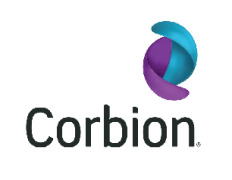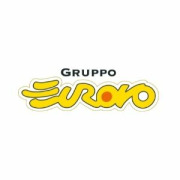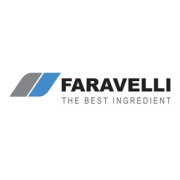Egg substitutes driven by vegan, allergen-free demand
13 Nov 2018Egg replacers have long been used as a way to avoid to the price fluctuations often associated with real eggs, but recently interest has been driven by manufacturer demand for clean label and plant-based ingredients, allowing companies to make more vegan and allergen-free claims.

Industry sometimes has been reluctant to use egg alternatives because of potential issues with their taste, texture and functionality in finished products when compared with real eggs. But rising interest in vegan and plant-based ingredients has encouraged a growing number of manufacturers to take eggs out of their product formulations. In addition, factors such as product recalls linked to salmonella contamination, as well as the generally lower cost of substitute ingredients, add up to a buoyant market.
According to a report from ResearchAndMarkets, the global egg replacement ingredients market is set to grow 5.7% a year from 2017 to 2022, to reach a value of US$1.2 billion by 2022. Typical applications for egg replacers include baked goods, as well as sauces, condiments and creamy dressings.
Many of the available egg replacers are blends, such as the range from Corbion Caravan, which aims to tap into demand for dairy-free ingredients in cakes and chemically leavened batters. Its egg replacers are made from specialised whey proteins, gums, enzymes and emulsifiers, which could replace 50%-100% of eggs or egg whites.
However, such blends often lead to longer ingredient lists, and many companies wanting to tap into demand for clean labels now are looking at simpler alternatives that could be perceived as more natural, such as aquafaba, the liquid drained from canned chickpeas, which has excellent foaming properties, or fibres made from dried citrus pulp.
Fiberstar Inc says its ingredient line – based on dried orange pulp – can be used to replace not just eggs, but also oils, fats, stabilisers and emulsifiers. In sauces, the company says it is possible to switch out both egg and soy lecithin, for example, as a clean label, allergen-free alternative. Other egg alternatives include powdered vegetable fats, such as those supplied by Faravelli, or soy-based whole egg replacers, such as those from Caltech Corp Ltd.
Increasingly, major meat and dairy companies are investing in meat and dairy alternatives, and the egg sector may be about to follow suit. For example, the biggest meat company in the US, Tyson Foods, has started referring to itself as a protein company after investing in meat alternatives, and the nation’s largest dairy company, Dean Foods, continues to invest in a range of non-dairy products. Now, in Europe, Italy-based Eurovo
, which distributes eggs and egg products across the continent, plans to begin distribution of an egg replacer from US-based JUST, made from mung bean protein isolate.
Further innovation in animal-free egg alternatives looks likely, as these ingredients tap into such a large number of current trends, including flexitarian and plant-based eating, allergen-free and cruelty-free foods. What is more, egg specialists like Eurovo may be uniquely placed to encourage further developments in plant-based alternatives.
Related news

Plastic packaging reduction requires industry rethink
6 Jan 2023
The food and beverage sector is calling for industry-wide collaboration and business model updates to reduce the environmental impact of plastic packaging.
Read more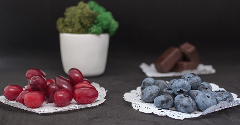
Misleading nutrition claims mask true sugar levels in baby food
5 Jan 2023
Some baby and toddler food and drink products, sweetened with fruit concentrate, contain up to four teaspoons of sugar per serving yet are marketed as having ‘no added sugar’, according to a survey by Action on Sugar.
Read more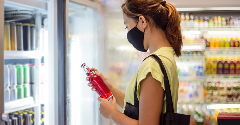
Asian beverage brands deal with rising costs
4 Jan 2023
Decreasing bottle sizes or increasing prices? Asian beverage brands are finding “creative approaches” to manage rising costs, according to industry analysts.
Read more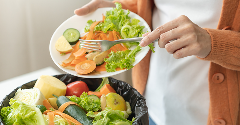
Preserving the freshness of food to fight waste
3 Jan 2023
Several companies are producing products that absorb ethylene, the hormone that causes food to ripen, in attempt to reduce food waste.
Read more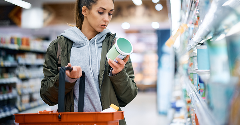
Value-seeking US consumers cut back on food spending
2 Jan 2023
Cheaper items, smaller sizes, and shorter grocery lists: inflationary effects coupled with a global long-term recession are set to continue shaping food spending habits, according to a recent Rabobank report.
Read more
Opportunities grow for lower-caffeine coffee
23 Dec 2022
Many consumers want the mental focus of caffeine without the jitters, prompting a wave of product development such as “half caffeine” ground coffee or ready-to-drink (RTD) cold brew blended with relaxing botanicals.
Read more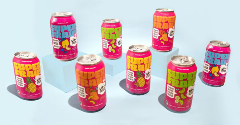
Superfrau upcycles liquid whey for energy drinks
22 Dec 2022
US company Superfrau turns surplus whey into sustainable, upcycled-certified dairy products for the recovery drinks market.
Read more
Malaysian brand Nanka brings jackfruit range to Europe
21 Dec 2022
Malaysian brand Nanka is expanding to new Asian and European markets with its fast and ready-to-eat plant-based products based on jackfruit.
Read more
Is the UK on target to meet its 2025 Plastics Pact?
20 Dec 2022
Major food industry players, including Arla, Kerry, PepsiCo and TerraCycle, have signed the UK’s voluntary Plastic Pact to reduce plastic from the supply chain – but are they on track to meet their targets?
Read more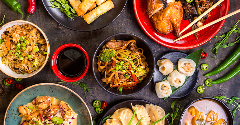
Chinese food brand wants to give customers ‘the full experience’
16 Dec 2022
Food brand Xiao Chi Jie is revamping Chinese cuisine for the modern American consumer. The Washington-based company sells regional Chinese specialties like soup dumplings, noodle kits, and barbeque skewers direct-to-consumer in the US.
Read more